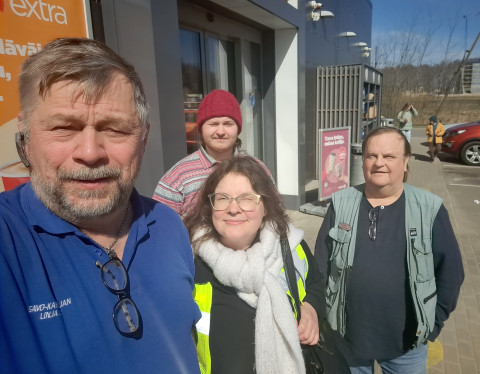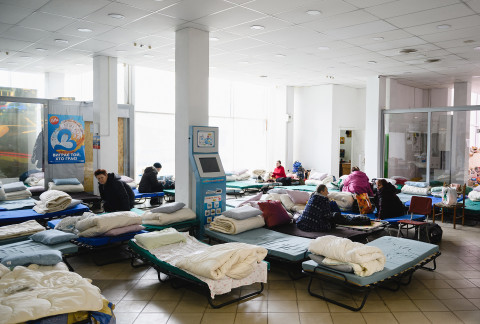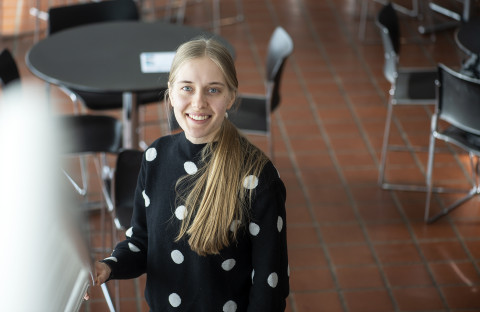Lately, students of the Russian language and culture at the University of Eastern Finland have been able to use of their knowledge of the language and culture in a meaningful way by helping Ukrainians. Besides relief efforts, it is also essential that Finland has experts capable of analysing and anticipating Russia.
- Text Nina Venhe | Photos Mostphotos, Varpu Heiskanen and Heikki Poutanen
When Russia launched its invasion of Ukraine, there was an urgent need for interpreters who could help Ukrainian refugees. That’s when Professor of Russian Language Larisa Leisiö reached out to her students, asking if they’d be interested in helping. Fifteen students volunteered as interpreters right away.
“Volunteering as an interpreter certainly develops the students’ professional skills, but in my view, they also find it as therapeutic and empowering under these circumstances. The students feel like their skills can make a difference,” Leisiö says.
This is also how the students themselves describe the situation.
“On a personal level, the war started by Russia came as a shock. I was ashamed that I’d ignored many warning signs and even blatant crimes merely as threatening rhetoric that is part of the Russian political culture – but these kinds of actions are not part of any culture, and must be strongly condemned,” says Maria Urpi, who is studying to become a teacher of Russian and English, describing her feelings.
Urpi is one of the students who joined a team of volunteers fetching a group of Ukrainian refugees to Finland from Poland via the Baltic states. Through Hane Peace Ukraine, an association established in Joensuu to help Ukrainians, the students got a change to collaborate with the Red Cross, both the Finnish and Estonian Border Guards, the Finnish customs authorities, and representatives of the Finnish Immigration Service.
Urpi says that her studies have proven extremely useful in the situation.
“I already hold a Master’s degree and I’ve completed a specialist training in Russian and Eastern European studies at the Aleksanteri Institute. I’ve also worked for the UN in Kyrgyzstan for some years, so I’m familiar with the region of the former Soviet Union, including Ukraine.”

Having a common language creates a sense of security
Olga-Maaria Nikula, a student of Russian, says that her desire to help emerged from having friends in Ukraine.
“I’m friends with a family in Ukraine, and after the war started, I wanted to do everything in my power to get them to safety. That’s why I joined the volunteers, and I worked as an interpreter in Poland, among other places. There, discussions with the aid workers were carried out in Russian.”
Nikula managed to find her friends who had fled to Poland, and she was able to get them in a car to Finland.
Both Urpi and Nikula say that having a common language made the Ukrainians feel safe both during the journey to Finland, and after arriving there.
“Russian is the language that has enabled me to help refugees in this horrendous situation, and the language that has allowed me to follow the resistance Russian dissidents are putting up in conditions that are almost impossible,” Urpi says.
She says that she also watches the news about refugees in a new way now.
“On our way back, we spent the night in Lithuania, where we and dozens of refugees slept in a big hall right next to each other, without any privacy. I couldn’t help thinking that I would soon get to go home, but for many refugees, this is what normal life will look like for years to come.”

An urgent need for experts
Back in Finland, Nikula says that she has been interpreting discussions between refugees and private individuals offering accommodation, for example. She has also interpreted at a press conference on the employment opportunities available to refugees.
Urpi says that right now, it is easy to convince herself, and others, of why knowledge of the Russian language and culture is important.
“Now more than ever, we need experts on Russia, language teachers, translators and interpreters. We are there to assist in the analysis of the situation, and we help refugees in schools, hospitals, organisations and job seeking.”
Both Urpi and Nikula consider it essential that experts of the Russian language and cultural are trained in Finland.
“Russia has become unpredictable, and we must be able to analyse, anticipate and even understand this large neighbour of ours, even though it seems impossible right now.”

Helping and getting the best practical training
According to Larisa Leisiö, the students’ involvement stems from a desire to help and provides them with extensive insight into what it is like to work as an expert – not only as an interpreter, but more broadly as an expert of language and culture.
“In that sense, this work is valuable not only because of the help the students are providing, but also for the purpose of their studies.”
When interpreting for Ukrainian refugees, the students become familiar with a new culture as well with a new language variant. Many people living in eastern Ukraine speak Russian as their mother tongue, but it is slightly different from the standard Russian taught in textbooks.
“Working with Ukrainian refugees is the best possible practical language training, although, of course, credit points aren’t the first thing on the students’ minds right now.”
Among the students of Russian, there are many people with a Russian background. Leisiö says that for them in particular, it has been important to do something concrete for Ukraine.
“This is their way of separating themselves from the official Russia and show that, despite their background, they are against the war.”



